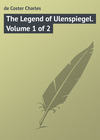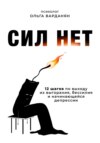Kitobni o'qish: «The Legend of Ulenspiegel. Volume 1 of 2», sahifa 6
XXXVI
Finding himself, on the morrow, upon a highway in the midst of a great crowd of folk, Ulenspiegel went with them, and soon knew that it was the day of the pilgrimage of Alsemberg.
He saw poor old women marching backwards, barefooted, for a florin and for the expiation of the sins of certain great ladies. On the edge of the highway, to the sound of rebecks, viols, and bagpipes, more than one pilgrim was holding a frying feast and junketing of bruinbier. And the smoke of delicious stews mounted towards heaven like a suave incense of food.
But there were other pilgrims, low fellows, needy and starveling, who, paid by the Church, were walking backwards for six sols.
A little man, completely bald, with staring eyes and a savage look, was skipping along backwards behind them reciting paternosters.
Ulenspiegel, wishing to know why he was mimicking the crayfishes in this fashion, planting himself before him and smiling, jumped in step with him. The rebecks, fifes, viols, and bagpipes, and the groans of the pilgrims made the music for the dance.
“Jan van den Duivel,” said Ulenspiegel, “is it that you may more certainly fall that you run in this wise?”
The man made no answer and went on mumbling his paternosters.
“Perhaps,” said Ulenspiegel, “you want to know how many trees there are along the road. But are you not counting the leaves also?”
The man, who was reciting a Credo, signed to Ulenspiegel to hold his tongue.
“Perhaps,” said the latter, still skipping before him and imitating him, “it is the result of some sudden madness that you should thus be going the contrary way to everybody else. But he who would have a wise answer from a madman is not wise himself. Is not this true, master of the peeled poll?”
As the man still made no answer, Ulenspiegel went on skipping, but making so much noise with his boot-soles that the road reëchoed like a wooden box.
“Maybe,” said Ulenspiegel, “you might be dumb, good sir?”
“Ave Maria,” said the other, “gratia plena et benedictus fructus ventris tui Jesu.”
“Maybe you are deaf as well?” said Ulenspiegel. “We shall see that: they say deaf men hear neither praises nor insults. Let us see if the drums of your ears are skin or brass: thinkest thou, lantern without candle, simulacrum of a foot-goer, that thou dost resemble a man? That will be when men are made of rags. Where has such jaundiced visnomy been ever seen, that peeled head, save on the gallows field? Wast thou not hanged of yore?”
And Ulenspiegel went on dancing, and the man, who was entering on the ways of wrath, was running backwards angrily still mumbling his paternosters.
“Maybe,” said Ulenspiegel, “thou comprehendest but high Flemish, I will speak to thee in the low: if thou art no glutton, thou art a drunkard, if no drunkard, but a water bibber, thou art foully choked elsewhere; if not constipated, thou art jerry-go-nimble; if not a lecher, a capon; if there be temperance, it was not that that filled the tun of thy belly, and if in the thousand million men that people the earth there were but one only cuckold, it would be thou.”
At this word Ulenspiegel sat down upon his seat, legs in air, for the man had fetched him such a blow with his fist under the nose that he saw more than a hundred candles. Then cunningly falling upon him, despite the weight of his belly, he struck him everywhere, and blows rained like hail upon the thin frame of Ulenspiegel, whose cudgel fell to the ground.
“Learn by this lesson,” said the man, “not to pester honest folk going on pilgrimage. For you may know that I go thus to Alsemberg according to custom to implore Madam Holy Mary to cause to miscarry a child my wife conceived when I was on my travels. To win so great a boon, a man must needs walk and dance backward from the twentieth step from his home to the foot of the church steps, without speaking. Alas! now I must begin all over again.”
Ulenspiegel having picked up his cudgel said:
“I shall help you, rascal, you who would have Our Lady serve to kill babes in their mothers’ womb.”
And he fell to beating the wretched cuckold so cruelly that he left him for dead on the road.
All this while there rose to heaven the groans of pilgrims, the sounds of fifes, viols, rebecks, and bagpipes, and, like a pure incense, the savour of frying.
XXXVII
Claes, Soetkin, and Nele were gossiping together about the ingle, and talked of the pilgrim on his pilgrimage.
“Daughter,” said Soetkin, “why cannot you, by the might of the spell of youth, keep him always with us?”
“Alas!” said Nele, “I cannot.”
“’Tis because,” said Claes, “he hath a counter charm that drives him to run without ever resting save for the work of his teeth.”
“The cruel, ugly fellow!” sighed Nele.
“Cruel,” said Soetkin, “I admit, but ugly, no. If my son Ulenspiegel has not a Greek or a Roman countenance, he is all the better for that; for they are of Flanders his agile feet, of the Frank of Bruges his keen brown eye, and his nose and his mouth made by two past masters in the science of humour and sculpture.”
“Who, then,” asked Claes, “made him his lazy arms and his legs too prone to run to pleasure?”
“His heart that is over young,” replied Soetkin.
XXXVIII
In these days Katheline by her simples cured an ox, three sheep, and a pig belonging to Speelman but could not cure a cow that belonged to Jan Beloen. The latter accused her of sorcery. He averred that she had cast a spell on the beast, inasmuch as, while giving his simples, she caressed and talked to it, doubtless in a diabolical speech, for an honest Christian should not talk to a beast.
The said Jan Beloen added that he was a neighbour of Speelman’s, whose ox, sheep, and pig she had healed, and if she had killed his cow, it was doubtless at the instigation of Speelman, jealous to see that his, Beloen’s, land was better tilled than his own. Upon the testimony of Peter Meulemeester, a man of good life and conduct, and also of Jan Beloen, certifying that Katheline was reputed a witch in Damme, and had doubtless killed the cow, Katheline was arrested and condemned to be tormented until she should have confessed her crimes and misdeeds.
She was questioned by a sheriff who was always in a rage, for he drank brandy all day long. He had Katheline put upon the first bench of torment in his presence and before the Vierschare.
The executioner stripped her naked, then shaved her hair and all her body, looking everywhere to see if she concealed a charm.
Finding nothing, he fastened her with cords to the bench. Then she spake:
“I am all shamed to be naked thus before these men, Madam Mary, grant that I may die!”
Then the executioner put wet cloths upon her breast, her belly, and her legs, and raising the bench, he poured hot water into her stomach in such quantities that she was all swelled up. Then he lowered the bench again.
The sheriff asked Katheline if she would confess her crime. She made sign that she would not. The executioner poured more hot water into her, but she vomited all of it out again.
Then at the chirurgeon’s bidding she was untied. She did not speak, but struck on her breast to say the hot water had burned her. When the sheriff perceived that she had recovered from this first torment he said to her:
“Confess thou art a witch, and that thou didst cast a spell upon the cow.”
“I will not confess,” said she. “I love all dumb beasts, as much as my poor heart may, and I would harm myself rather than them, who cannot defend themselves. I used the needful simples to cure the cow.”
But the sheriff:
“Thou didst give her poison,” said he, “for the cow is dead.”
“Master sheriff,” answered Katheline, “I am here before you, in your power. I dare say to you, nevertheless, that a beast can die of sickness, like a man, in spite of the assistance of the surgeons and the doctors. And I swear by my Lord Christ who died on the cross for our sins, that I have wished no harm to this cow, but sought to cure her by simple remedies.”
Then said the sheriff, enraged:
“This devil’s hag will not always deny, let her be put on another bench for the torment!”
And therewith he drank a great glass of brandy.
The executioner made Katheline sit on the lid of an oaken coffin placed upon trestles. The said lid, shaped like a roof, was sharp as a blade. A great fire was burning in the fireplace, for it was then November.
Katheline, seated upon the coffin and a spit of sharpened wood, was shod with tight shoes of new leather and set before the fire. When she felt the sharp wooden edge of the coffin and the pointed spit entering her flesh, and when the fire heated and shrank the leather of her shoes, she cried:
“I suffer a thousand pangs! Who will give me black poison?”
“Put her nearer the fire,” said the sheriff. Then questioning Katheline:
“How often,” said he, “didst thou bestride a broom to go to the Sabbath? How often didst thou blast the corn in the ear, the fruit upon the tree, the babe in the mother’s womb? How often didst thou turn two brothers to sworn foes, and two sisters into rivals filled with hatred?”
Katheline would have spoken, but could not, and moved her arms as though to say no. The sheriff then:
“She will only speak when she feels all her witch fat melt in the fire. Put her nearer.”
Katheline cried out. The sheriff said:
“Pray to Satan that he may cool thee.”
She made a movement as though she would take off her shoes that were smoking in the fierceness of the fire.
“Pray to Satan that he pull off thy shoes,” said the sheriff.
The clock was striking ten, the furious creature’s dinner hour; he went away with the executioner and the clerk, leaving Katheline alone before the fire, in the torture chamber.
At eleven they came back and found Katheline seated stiff and motionless. The clerk said:
“She is dead, I think.”
The sheriff ordered the executioner to take Katheline down from the coffin and the shoes from off her feet. Not being able to pull them off, he cut them away, and the feet of Katheline were disclosed red and bleeding.
And the sheriff, thinking of his meal, looked at her without a word; but presently she recovered her senses, and falling on the ground and unable to rise for all her efforts, she said to the sheriff:
“Once on a time wouldst fain have had me to wife, but now thou shalt not have me. Four times three it is the sacred number, and the thirteenth is the husband.”
Then as the sheriff would have spoken, she said to him:
“Stay silent, he has hearing finer than the archangel that in heaven counts the heart beats of the just. Why dost thou come so late? Four times three it is the sacred number, he slayeth those that desire me.”
The sheriff said:
“She receives the devil in her bed.”
“She is out of her wits with the anguish of the torment,” said the clerk.
Katheline was taken back to prison. Three days after, the sheriff’s court being assembled in the Vierschare, Katheline after deliberation was condemned to the fire.
The executioner and his assistants brought her to the marketplace of Damme where there was a scaffold on which she mounted. In the marketplace were the provost, the herald, and the judges.
The trumpets of the town herald sounded three times, and turning to the people he announced:
“The magistrate of Damme, having had compassion on the woman Katheline, has been pleased not to exact punishment according to the extreme rigour of the law of the town, but in order to bear witness that she is a witch, her hair shall be burned, she shall pay twenty gold carolus by way of fine, and shall be banished for three years from the precincts of Damme under pain of losing one limb.”
And the people applauded this harsh lenity.
The executioner thereupon bound Katheline to the stake, set a wig of tow upon her shaven head and set it on fire. And the tow burned long and Katheline cried out and wept.
Then she was unbound and taken without the boundaries of Damme upon a cart, for her feet were burned.
XXXIX
Ulenspiegel being now at Bois-le-Duc in Brabant, the magnates of the town would fain have appointed him their fool, but he would none of this dignity. “Pilgrim on pilgrimage cannot play fool as a permanency, but only at inns and on the highways.”
At this same time Philip, who was King of England, came to visit the countries of his future inheritance, Flanders, Brabant, Hainault, Holland, and Zealand. He was then in his twenty-ninth year; in his grayish eyes dwelt sour melancholy, savage dissimulation, and cruel resolution. Cold was his countenance, and stiff his head covered with tawny hair; stiff, too, his meagre torso and spindle limbs. Slow was his speech and thick as though he had wool in his mouth.
Amid tourneys, jousts, and feastings, he visited the joyous duchy of Brabant, the rich county Flanders, and his other seignories. Everywhere he swore to observe and confirm the privileges; but when at Brussels he took oath upon the Testament to observe the Golden Bull of Brabant his hand clenched so tight that he must needs take it away from the sacred book.
He went to Antwerp, where they put up twenty-three triumphal arches to receive him. The city disbursed two hundred and eighty-seven thousand florins to pay for these arches and for the costumes of eighteen hundred and seventy-nine merchants all clad in crimson velvet and for the rich livery of four hundred and sixteen lackeys and the brilliant silk trappings of four thousand burgesses, all clad alike. Many feasts were given by the rhetoricians of all the cities in the Low Countries, or nearly all.
There were seen, with their fools male and female, the Prince of Love, of Tournai, mounted upon a sow that was called Astarte; the King of Fools, of Lille, who led a horse by the tail and walked behind; the Prince of Pleasure, of Valenciennes, who amused himself counting how many times his donkey broke wind; the Abbot of Mirth, of Arras, who drank Brussels wine from a flask shaped like a breviary, and that was gay reading; the Abbot of the Paux-Pourvus, of Ath, who was provided with linen full of holes and boots down at heel, but had a sausage with which he made good provision for his belly; the Provost of Madcaps, a young man mounted on a shy goat, and who trotting in the crowd got many a thwack because of her; the Abbot of the Silver Dish, from Quesnoy, who mounted on his horse pretended to be sitting in a dish, saying “there is no beast so big that fire cannot cook him.”
And they played all kinds of harmless foolery, but the King remained sad and severe.
That same evening, the Markgrave of Antwerp, the burgomasters, captains and deans, assembled together to find out some game or play that might win Philip the King to laughter.
Said the Markgrave:
“Have ye not heard tell of a certain Pierkin Jacobsen, the town-fool of Bois-le-Duc, and far renowned for his merry tricks?”
“Yes,” said the others.
“Well!” said the Markgrave, “let us summon him to come hither, and bid him do us some nimblewitted turn, since our own fool has his boots stuffed with lead.”
“Let us summon him hither,” said they.
When the messenger from Antwerp came to Bois-le-Duc, they told him that the fool Pierkin had snuffed out his candle with over-much laughing, but that there was in the town another fool, a bird of passage, called Ulenspiegel. The messenger went to look for him in a tavern where he was eating a fricassee of mussels and making a petticoat for a girl with the shells.
Ulenspiegel was delighted when he knew that it was for him the courier of the commune had come all the way from Antwerp, mounted upon a fine horse of Vuern-Ambacht and leading another by the bridle.
Without setting foot to ground, the courier asked him if he knew where to find a new trick to make King Philip laugh.
“I have a mine of them under my hair,” answered Ulenspiegel.
They went away together. The two horses galloping loose-reined brought Ulenspiegel and the courier to Antwerp.
Ulenspiegel made his appearance before the Markgrave, the two burgomasters, and the officials of the commune.
“What do you intend to do?” asked the Markgrave.
“Fly in the air,” replied Ulenspiegel.
“How will you set about this?” asked the Markgrave.
“Do you know,” asked Ulenspiegel, “what is worth less than a burst bladder?”
“I do not know,” said the Markgrave.
“A secret that has been let out,” replied Ulenspiegel.
In the meanwhile, the heralds of the games, mounted upon their handsome steeds caparisoned with crimson velvet, rode through all the main streets, squares, and carfaxes of the city, sounding clarions and with beat of drum. In this fashion they announced to the signorkes and the signorkinnes that Ulenspiegel, the fool of Damme, would fly in the air at the quay, there being present upon a staging King Philip and his high illustrious and distinguished company.
Over against the staging there was a house built in the Italian fashion, with a gutter running along the whole length of the roof. A garret window opened upon the gutter.
Ulenspiegel on this day went through the city everywhere riding upon an ass. A footman ran alongside him. Ulenspiegel had donned the fine robe of crimson silk the magnates of the commune had given him. His headgear was a hood, crimson as well, on which were seen two asses’ ears with a bell on the tip of each. He wore a necklace of copper medallions embossed with the shield of Antwerp. On the sleeves of the robe there tinkled at each pointed elbow a gilt bell. He had shoes with gilt soles, and a bell at the tip of each.
His ass was caparisoned with crimson silk and on each thigh carried the shield of Antwerp broidered in fine gold.
The footman brandished a donkey’s head in one hand and in the other a branch at the end of which chimed a cowbell from a forest-bred cow.
Ulenspiegel, leaving his ass and his footman in the street, climbed up into the gutter.
There, shaking his bells, he opened out his arms as if he was on the point of flying. Then leaning down towards King Philip, he said:
“I thought there was no fool in Antwerp save only me, but I perceive the town is full of them. If you had told me you were going to fly, I should not have believed you; but let a fool come and tell you he will do it, and you believe him. How would you have me fly, since I have no wings?”
Some laughed, others swore, but all said:
“This fool says what is none the less quite true.”
But King Philip remained stiff as a king of stone.
And the magnates of the commune said softly one to the other:
“There was no need to make such great festival for such a sour-face.”
And they gave three florins to Ulenspiegel, who departed, first perforce restoring to them the robe of crimson silk.
“What are three florins in the pouch of a young man but a snowball before a fire, a full bottle in front of you, wide-throated drinkers? Three florins! The leaves fall from the trees and sprout again upon them, but florins leave pouches and return thither no more: the butterflies flitter away with the summer time, and the florins, too, although they weigh two estrelins and nine as.”
So saying, Ulenspiegel contemplated his three florins closely.
“What a haughty mien,” murmured he, “hath the Emperor Charles upon the obverse, cuirassed and helmeted, holding a sword in one hand and in the other the globe of this poor earthly world! He is by the grace of God Emperor of the Romans, King of Spain, and so forth, and he is most gracious towards these our countries, this emperor in the cuirass. And here on the reverse is a shield on which are graven and displayed the arms of a duke, count, etc., pertaining to his divers possessions, with this goodly device: Da mihi virtutem contra hostes tuos: ‘Give me strength against thy enemies.’ He was valiant indeed against those of the reformed that have goods to confiscate, and he inheriteth them. Ah! were I the Emperor Charles, I would have florins minted for everybody, and each man being rich, no one should work more.”
But Ulenspiegel looked in vain at the lovely money; it was gone towards the land of ruin to the clinking of quart pots and the chiming of bottles.
XL
While he displayed himself on the gutter all clad in crimson silk, Ulenspiegel had not seen Nele who from the crowd was looking on him smiling. She was living at this time at Borgerhout near Antwerp, and thought that if some fool was to fly before King Philip, it could only be her friend Ulenspiegel.
As he marched along the way, plunged in reverie, he did not hear a sound of hastening steps behind him, but felt two hands that were laid flat upon his eyes. Guessing Nele instinctively:
“Are you there?” said he.
“Aye,” she said, “I have been running behind you ever since you came out of the city. Come with me.”
“But where,” said he, “where is Katheline?”
“Thou dost not know it,” said she, “that she was tortured unjustly for a witch, then banished out of Damme for three years, and that they burned her feet and burned tow upon her head. I tell thee this that thou mayest have no fear of her, for she is out of her wits because of the cruel torment. Often she spends whole hours looking at her feet and saying: ‘Hanske, my sweet devil, see what they did to thy dear. And her poor feet are like two wounds.’ Then she weeps, saying: ‘Other women have a husband or a lover, but I live at this moment as a widow.’ I tell her then that Hanske will hate her if she speaks of him before other folk than me. And she obeys me like a child save when she sees a cow or an ox, the cause of her torture; then she flees running without stay, and nothing can stop her, fences, streams, or ditches, till she falls for weariness in some corner of the wayside or against the wall of a farm, whither I go and take her up and dress her poor feet that are by then all bleeding. And I deem that in burning the hank of tow they burned also her brain in her head.”
And both were grieved thinking upon Katheline.
They came to her and saw her sitting upon a bench in the sun against the wall of a house. Ulenspiegel said to her:
“Do you know me?”
“Four times three,” quoth she, “it is the sacred number, and the thirteenth is Thereb. Who art thou, child of this wicked world?”
“I am Ulenspiegel,” he answered, “the son of Soetkin and of Claes.”
She shook her head and knew him; then beckoning him close with her finger and bending to his ear:
“If thou see him whose kisses are as snow, tell him to come back to me, Ulenspiegel.”
Then showing her burned hair:
“I am ill,” she said; “they have taken my wits, but when he comes he will fill my head again, which now is all empty. Hearest thou? it sounds like a bell; it is my soul knocking at the door to depart, because it burns. If Hanske comes and has no mind to fill me my head again, I will tell him to make a hole in it with a knife: the soul that is there, ever knocking to come out, grieveth me cruelly, and I shall die, yea. And now I never sleep, and I look for him always, and he must fill me my head again, yea.”
And sinking down again, she groaned.
And the peasants that were coming back from the fields to go to dinner, while the church bell called them to it, passed before Katheline saying:
“There is the madwife.”
And they made the sign of the cross.
And Nele and Ulenspiegel wept, and Ulenspiegel must needs go on upon his pilgrimage.












